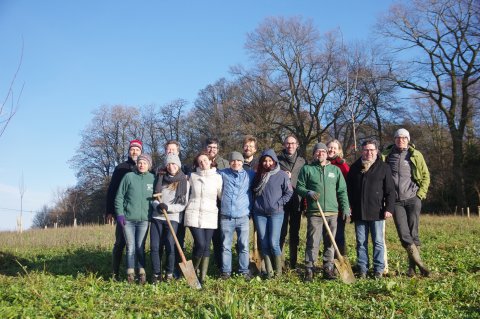Between 2017 and 2019, nine European countries and thirteen partners, EURAF among them, within the AFINET project exchanged questions, ideas and experiences around (innovations in) agroforestry.
During their final meeting and to help the sector, the partners put their backs into the planting of a new forest garden of 3 ha in Asse, Belgium. On Tuesday 10 December they planted the first trees of this initiative.
In 2017 the horizon 2020 project AFINET (Agroforestry Innovation Network) started as a thematic network around agroforestry. Agroforestry is a sustainable form of agriculture in which agricultural crops or livestock are cultivated together with woody crops on the same plot. By applying multi-layered cultivation, agroforestry uses the limited space for agriculture more efficiently.
Taking into account climate and landscape
Over the past few years thirteen partners in Spain, United kingdom, Belgium, Portugal, Poland, Hungary, Italy, France, and Finland have worked hard to make Agroforestry more efficient in an agricultural context. They also identified innovations in modern agriculture taking into account climate and landscape.
“Each region has specific characteristics in terms of land use, climate conditions, socio-economic context and policy. Everybody who wants to start agroforestry has to take this into account”, ILVO researcher Bert Reubens clarifies. “Yet we can learn a lot from each other. From the experiences of the partners we can distil inspiration for innovation. Across the borders a lot of challenges are comparable. To move policy makers an international signal has a greater impact than a local story.”
Knowledge exchange trough workgroups
In each of the participating countries there was an intensive and interactive knowledge exchange process through working groups with relevant stakeholders. “Farmers were our main target audience. They possess a wealth of practical knowledge”, advisor Ruben Mistiaen from Inagro states. “Over time they will be the ones to convert theory into practice and earn a living from it.” Every six months farmers got together to share tips and tricks. “This gave us the opportunity to gather their knowledge and put them in touch with the market, advisors, researchers and policy makers”.
The partners in the AFINET Project want to promote sustainable agriculture in Europe and help farmers cope with the climate challenges of today and the future, through knowledge about agroforestry. “This is why we unlock the knowledge through video materials, factsheets, tutorials and technical articles.” Interested parties can find the information by browsing clicking the button ‘Materials’ on the website.
Getting to work and trees in the ground
At the end of 2019 the AFINET project ends. To conclude the partners of the AFINET-project brought agroforestry to the attention of the European parliament. During a conference in Brussels the project results were disseminated to stakeholders. To help the sector, the partners of the AFINET Project have put their backs into the planting of a new forest garden of 3 ha in Asse, Belgium. To accomplish this they collaborated with Forest Farm vzw. On Tuesday 10 December the first tree was planted by the project partners.
Laurence Claerhout and Alexandre Stroobants from Forest Farm vzw believe in circular agriculture. “In a forest garden, agriculture and nature do not have to fight for the available space”, Laurence clarifies. Fruit trees, berries, herbs, climbers - such as grapes – and vegetables will have their place in the forest garden in Asse. “Thanks to the reduced soil tillage the forest garden will result in a better and healthier soil life and a better soil fertility. A rich variety of species also has a positive effect on the presence of natural pest control.”
Pictures are available on INAGRO webste.












